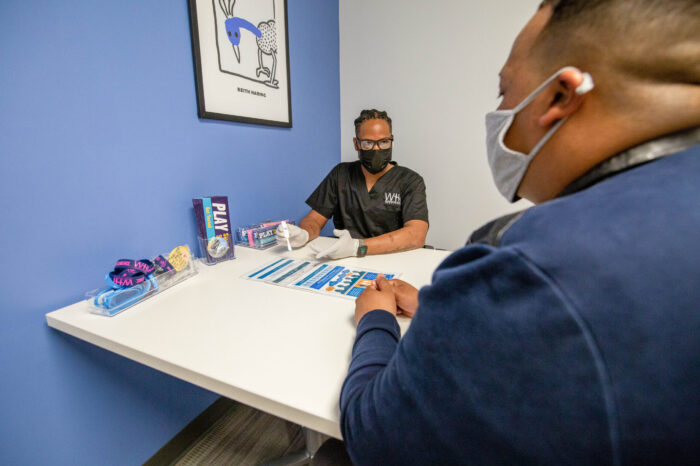INFECTIOUS DISEASE CARE
Providing treatment for patients with suspected infectious diseases, including HIV/AIDS, Hepatitis C and more.

The diagnosis and treatment of infectious diseases is at the heart of Washington Health Institute’s dedication to comprehensive, compassionate and accessible care. The role of our infectious disease specialists is to review your medical history and records, conduct examinations, detect the presence of infectious diseases and provide treatment.
We provide testing and treatment for patients with suspected infectious diseases, including HIV/AIDS, Hepatitis C, sexually transmitted diseases, osteomyelitis and fungal infections. We also offer Pre-Exposure Prophylaxis (PrEP) & Post Exposure Prophylaxis (PEP) to prevent HIV infection.
WASHINGTON D.C. INFECTIOUS DISEASE CARE
Our Infectious Disease specialists work with your primary care physician to ensure you receive the quality care you need based on your existing or suspected condition(s). Washington Health Institute provides testing and treatment options for patients with a variety of suspected infectious diseases, including HIV/AIDS, Hepatitis C, Tuberculosis, Osteomyelitis and fungal infections. Our office also provides Pre-Exposure Prophylaxis (PrEP) and Post Exposure Prophylaxis (PEP) medications for those at risk of contracting HIV through sexual contact or injection drug use.
In addition to the detection, diagnosis and treatment of these infectious diseases, our office provides Red Carpet appointments for individuals who are newly diagnosed with HIV or are re-engaging in HIV care. More information about many of these infectious diseases and preventative care treatments is available below.
HIV/AIDS
Human Immunodeficiency Virus (HIV) is a sexually transmitted infection (STI) that damages and weakens the immune system, interfering with your body’s ability to fight off infection and disease. Without medication and treatment, HIV can weaken the immune system to the point that a patient develops Acquired Immunodeficiency Syndrome (AIDS), which is a chronic and potentially life-threatening condition.
HIV/AIDS may be contracted via sexual contact or by direct contact with infected blood. Mothers may also pass this disease to children during pregnancy, childbirth or breastfeeding. At this point in time, there is no cure for HIV/AIDS. However, medications and treatments exist that can dramatically slow the progression of the disease.

Hepatitis C
Hepatitis C is an infection of the liver caused by the hepatitis C virus (HCV) that results in inflammation, sometimes leading to significant liver damage. Hepatitis C is transmitted through direct contact with contaminated blood, often through sharing needles or other equipment used to prepare and inject drugs.
Thanks to recent advancements in medicine, chronic HCV can often be cured, though early detection and treatment are essential to avoid significant, lasting damage to the liver. Many patients do not even realize they have HCV until serious liver damage has already occurred, which means it is essential to stay on top of regular visits to a primary care physician and take care to note any symptoms that do occur.
Tuberculosis
Tuberculosis, or TB, is an infectious disease that primarily affects the lungs. The most well-known symptom of this disease is coughing up blood, though it is far from the only symptom and usually not the first to present itself in an affected patient. Tuberculosis is transmitted when an infected individual releases tiny droplets into the air via coughs and sneezes that are then inhaled by a healthy person, spreading the bacteria that causes TB.
While tuberculosis is curable, many strains of the disease are resistant to the drugs often used to treat it. This means that those with tuberculosis must often pursue multiple medication and treatment options overtime to completely cure the infection and prevent the development of further antibiotic resistance.
